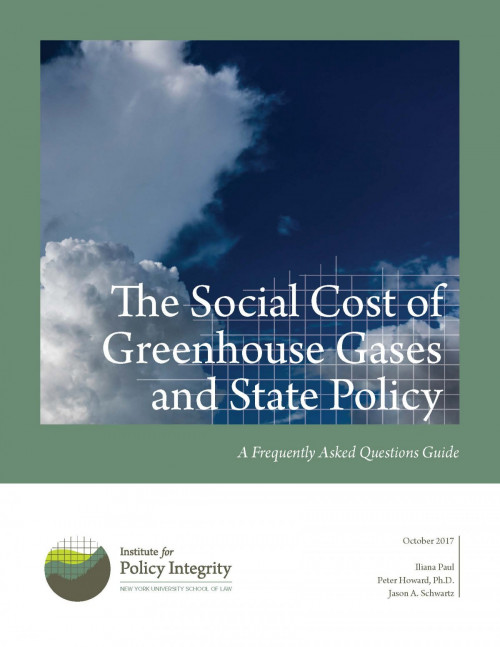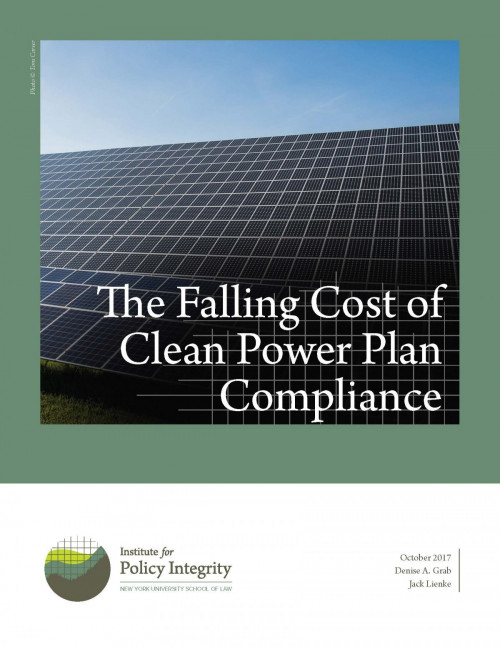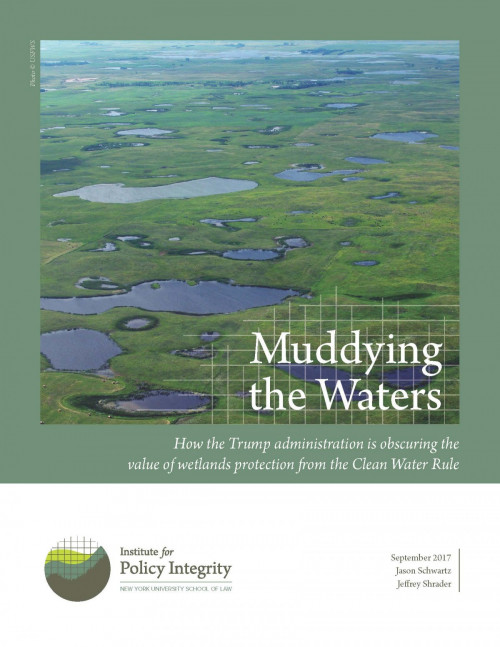-
Brief on Wyoming Natural Gas and Oil Leases
Wildearth Guardians and Physicians for Social Responsibility recently sued the Bureau of Land Management over its leasing of lands in Wyoming for natural gas and oil extraction. In our amicus brief in support of the legal challenge, we argue that the agency’s decision to trumpet the benefits of the leasing decisions while also failing to quantify the greenhouse gas emissions that will result from these leases (and failing to use the social cost of carbon to assess the impact of those emissions on society) violated the National Environmental Policy Act.
-
Comments to the Federal Energy Regulatory Commission on Grid Reliability and Resilience Pricing
Energy Secretary Rick Perry’s controversial proposal to subsidize coal and nuclear plants could have terrible consequences for consumers and public health, as our recent comments and op-ed in US News highlight. In September, Perry asked the Federal Energy Regulatory Commission (FERC) to adopt a new rule that would guarantee coal and nuclear plants their full costs plus a profit, so long as they keep 90 days of fuel on site. Perry claims that these “fuel-secure” plants ensure grid reliability and resilience, but neither he nor FERC adequately define these terms or explain why such a measure is justified.
-
Comments on Reconsideration of NHTSA Rule to Update Civil Penalties
In December 2016, the National Highway Traffic Safety Administration (NHTSA) finalized a rule that updates civil penalties for car manufacturers that violate fuel economy standards. NHTSA is now reconsidering the rule, claiming it would have a significant negative economic impact. The agency provides no evidence that economic circumstances have changed since the rule’s finalization to make the rule more costly. Our comments argue that the agency should not proceed with the proposed reconsideration, because it inadequately explained why it changed positions. If the agency does continue with the reconsideration, both the Inflation Adjustment Act and economic cost-benefit analysis would justify an update to the penalties rates rather than maintaining the original penalty rate from 1975.
-

The Social Cost of Greenhouse Gases and State Policy
A Frequently Asked Questions Guide
States can benefit from using the social cost of greenhouse gases to aid in making rational policy decisions in a transparent manner. Many states are already using these metrics in their decisionmaking. This report provides information on several issues related to the social cost of greenhouse gases, including discount rates, time horizons, and the global nature of the estimate.
-
Public Comments on Regulatory Review (CFTC, CPSC, Department of Education, PBGC, USDA)
Many federal agencies are requesting the public’s suggestions for rules to repeal or reform, tacitly implying that most regulations stifle economic growth. In comments to several agencies, we argue that regulatory review should consider the public benefits of regulation, not just the costs to regulated industries, and should prioritize review of rules for which actual costs and benefits diverge significantly from predicted costs and benefits.
-

The Falling Cost of Clean Power Plan Compliance
In 2015, the U.S. Environmental Protection Agency (EPA) released the Clean Power Plan, a Clean Air Act rule designed to address the threat of climate change by cutting carbon dioxide emissions from fossil fuel-fired power plants. As part of that rulemaking, the agency prepared an estimate of compliance costs, which it found would be far outweighed by the rule’s climate and health benefits. Since that time, changes in the electric sector have made it even cheaper to meet the rule’s emission targets than EPA anticipated. This report summarizes the findings of EPA’s 2015 Regulatory Impact Analysis; discusses subsequent market and policy developments that have lowered the cost of complying with the Clean Power Plan; and surveys more recent analyses by independent groups, which have estimated substantially lower compliance costs than EPA did.
-

Muddying the Waters
How the Trump administration is obscuring the value of wetlands protection from the Clean Water Rule
In 2015, the Environmental Protection Agency and Army Corps of Engineers revised the definition of the “waters of the United States” as part of the Clean Water Rule. This revised definition was expected to increase the wetland area subject to protection under the Clean Water Act, and an economic analysis conducted by the agencies at the time showed that the benefits of the rule would substantially outweigh the costs. Under the Trump administration, the agencies now propose to repeal the 2015 Clean Water Rule and have issued a revised economic analysis in support of that decision. In the new analysis, the agencies now claim that the majority of the benefits in the 2015 analysis cannot be quantified, making it appear that the Clean Water Rule is not cost-benefit justified. The agencies have violated many of their own requirements for conducting economic analysis to arrive at this conclusion, and a more comprehensive assessment of the evidence shows that the 2015 Clean Water Rule is still cost-benefit justified. Repealing the 2015 Rule would forgo substantial environmental and economic benefits.
-
Joint Comments on Fuel Economy Standards and the Social Cost of Greenhouse Gases
Vehicle fuel economy standards set by the National Highway Traffic and Safety Administration (NHTSA) help reduce greenhouse gas emissions in the United States by making cars more fuel efficient. Our comments on the reconsideration argue that NHTSA should value the social cost of those emissions as robustly as possible, as they have done in the past. We encourage NHTSA to consider the social cost of greenhouse gases in both the rule’s Environmental Impact Statement and Regulatory Impact Analysis, and that it should use estimates considering global damages of climate change using a three percent or lower discount rate.
-
Comments on Delay of Department of Labor’s Fiduciary Rule
The Department of Labor’s Fiduciary Rule requires investment advisors to serve the best interests of their retiree clients. In August 2017, Labor proposed to stay the rule’s enforcement provisions. In our comments on the proposed delay, we argue that the delay violates basic administrative law principles.
-
Comments to OSHA on Beryllium Standards Revocation
In public comments to the Occupational Safety and Health Administration, we highlight some critical problems with the agency’s cost-benefit analysis in its proposed revocation of standards to protect workers from exposure to beryllium. These ancillary standards were designed to protect workers in the construction and shipyard sectors.
Viewing recent projects in Government Transparency




